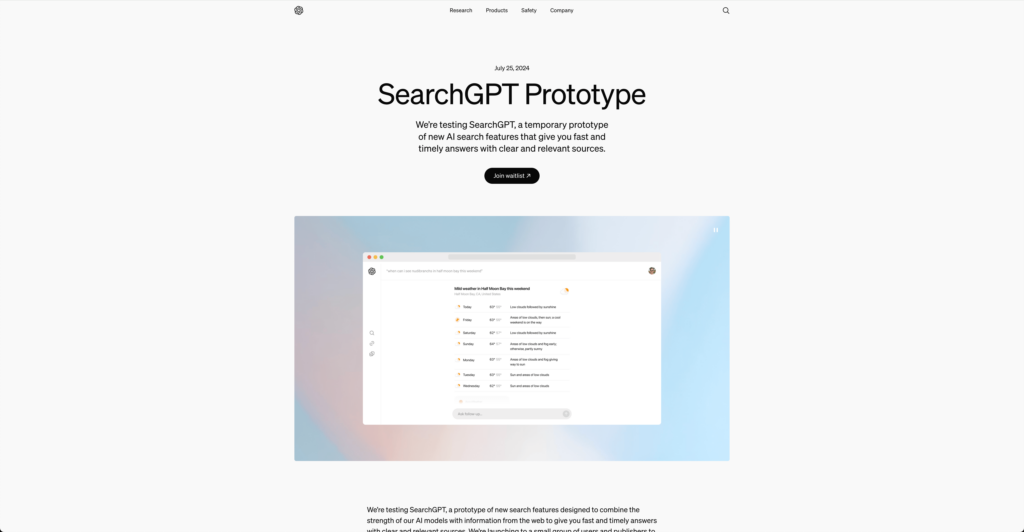In the ever-evolving landscape of digital technology, a seismic shift is on the horizon. OpenAI, the trailblazing artificial intelligence research laboratory, has just unveiled a prototype that could redefine how we interact with the vast expanse of information on the internet. Enter SearchGPT, a revolutionary AI-powered search engine that promises to deliver not just results, but answers.
But here’s where it gets really interesting: SearchGPT isn’t just another incremental improvement in search technology. It’s a fundamental reimagining of what a search engine can be. And if you’re in the business of digital marketing, content creation, or really any field that relies on online visibility, you need to sit up and pay attention. Because the game is about to change, and you’ll want to be ahead of the curve.
TL;DR: SearchGPT is Here
- OpenAI just dropped a bombshell: SearchGPT, an AI-powered search engine that’s about to flip the script on how we find information online.
- “It’s not just another search engine” – it’s your new AI research assistant that actually understands what you’re asking.
- Goodbye endless scrolling, hello direct answers with clear sources. It’s like having a conversation with the entire internet.
- Publishers, don’t panic! OpenAI is playing nice, giving you control over how your content appears and is used.
- Google’s sweating bullets – their stock dropped 3% on the news. Is the search giant’s reign coming to an end?
- Digital marketers, time to level up! It’s not just about SEO anymore; it’s about being the go-to source for AI.
- The future of search is conversational, contextual, and powered by AI. And it’s happening right now.
- Buckle up, because whether you’re a user, creator, or marketer, the game is about to change. Are you ready?
What is SearchGPT?
SearchGPT is OpenAI’s latest brainchild, described as “a temporary prototype of new AI search features that give you fast and timely answers with clear and relevant sources.” But don’t let the word “temporary” fool you. This prototype is a glimpse into the future of search, and its impact is likely to be anything but fleeting.
At its core, SearchGPT is designed to enhance the conversational capabilities of AI models with real-time information from the web. The result? A search experience that’s faster, more intuitive, and infinitely more helpful than traditional search engines.
Key features of SearchGPT include:
- Direct answers to questions, not just a list of links
- Clear attribution and links to sources
- The ability to ask follow-up questions, creating a conversational search experience
- A user interface that categorises results with short descriptions and visuals
But SearchGPT isn’t just about providing a better user experience. It’s also about creating a more symbiotic relationship between AI, users, and content creators.

The Technology Behind SearchGPT
You might be thinking, “Alright, but how is this different from ChatGPT or other AI language models?” Here’s where it gets really fascinating.
SearchGPT combines the power of advanced AI language models with real-time web crawling. This means it’s not just drawing from a static database of information, but actively searching the web to provide up-to-date answers. It’s like having a super-intelligent research assistant who can read and understand the entire internet in seconds.
But the real magic lies in how SearchGPT processes and presents this information. Instead of simply regurgitating facts, it synthesises information from multiple sources, provides context, and presents it in a conversational manner. It’s not just searching; it’s understanding.
SearchGPT’s User Experience and Interface
Now, let’s talk about what this means for the average user. Imagine you’re planning a trip to Japan and you want to know about the best time to see cherry blossoms. With a traditional search engine, you’d type in your query, scroll through a list of links, click on several, and piece together the information yourself.
With SearchGPT, you’d simply ask, “When’s the best time to see cherry blossoms in Japan?” And you’d get a concise answer, something like:
“The best time to see cherry blossoms in Japan is typically late March to early April, but it can vary depending on the location and weather conditions. In Tokyo, the average bloom time is around March 29, while in Kyoto it’s around April 1. However, the full bloom only lasts about a week, so timing is crucial.”
But here’s where it gets even more interesting. You could then ask follow-up questions like, “What are some less crowded spots to see cherry blossoms?” or “How does climate change affect cherry blossom seasons?” SearchGPT would understand the context of your previous question and provide relevant, detailed answers.
This conversational approach to search isn’t just more convenient; it’s a fundamental shift in how we interact with information online.
SearchGPT’s Impact on Publishers and Content Creators
If you’re a content creator or publisher, you might be feeling a bit apprehensive about SearchGPT. After all, if it’s providing direct answers, what happens to your website traffic? This is where partnering with a SearchGPT Agency becomes crucial to navigate these changes effectively.
But here’s the silver lining: OpenAI seems acutely aware of these concerns and is taking a collaborative approach with SearchGPT. They’ve emphasized that the prototype is designed to help users connect with publishers by prominently citing and linking to them in searches.
In fact, OpenAI has already partnered with several major publishers, including The Atlantic and News Corp. Nicholas Thompson, CEO of The Atlantic, stated: “AI search is going to become one of the key ways that people navigate the internet, and it’s crucial, in these early days, that the technology is built in a way that values, respects, and protects journalism and publishers.”
OpenAI is also giving publishers more control over how their content appears in SearchGPT. They can manage how they’re represented in search results and even opt out of having their content used for training OpenAI’s models while still appearing in search results. A skilled SearchGPT Agency can help you optimize these settings to maximize your visibility and protect your content.
This approach could actually lead to increased visibility for high-quality, authoritative content. If you’re producing valuable, accurate information, SearchGPT could become a powerful tool for connecting you with your audience. However, to fully leverage this potential, it’s essential to understand the nuances of SearchGPT optimization, which is where the expertise of a SearchGPT Agency can be invaluable.
By working with a SearchGPT Agency, you can ensure that your content is not only discoverable but also presented in the most favourable light within this new AI-powered search ecosystem. This proactive approach can help turn the challenges of AI search into opportunities for greater reach and engagement.

SearchGPT vs. Traditional Search Engines
Now, let’s address the elephant in the room: Google. As of June 2024, Google dominates the search engine market with a staggering 91.1% share, according to web analytics firm Statcounter. That’s a lot of market share to disrupt.
But here’s where it gets really interesting. A recent joint study by Datos and SparkToro revealed that 58.5% of Google searches in the U.S. and 59.7% in the EU result in zero clicks. These “zero-click” searches occur when users find the information they need directly on the search results page or abandon the search without clicking any links.
The potential threat posed by SearchGPT to Google’s dominance hasn’t gone unnoticed by the market. On the day OpenAI announced the SearchGPT prototype, Alphabet Inc., Google’s parent company, saw its stock price plummet by 3%. This significant drop, which saw the stock close at $169.16 USD, reflects investor concerns about the long-term implications of AI-powered search engines on Google’s core business model. While it’s too early to predict the long-term impact, this market reaction underscores the disruptive potential of technologies like SearchGPT in the search landscape.
SearchGPT is perfectly positioned to capitalise on this trend. By providing direct, conversational answers, it’s essentially turning every search into a potential “zero-click” interaction. But unlike with traditional search engines, these interactions are designed to prominently feature and link to the original sources of information.
This could fundamentally change the way we think about search engine optimisation and online visibility. It’s no longer just about getting users to click on your link; it’s about having your content recognised and featured as a authoritative source by AI.
SearchGPT’s Implications for Digital Marketers
If you’re in digital marketing, you’re probably wondering what all this means for your strategies. Well, buckle up, because we’re entering a new frontier.
- Content Quality Over Quantity: With AI able to synthesise information from multiple sources, the emphasis will shift even more towards creating high-quality, authoritative content. It’s not about gaming the algorithm anymore; it’s about genuinely being the best source of information in your niche.
- Structured Data Becomes Crucial: As AI systems like SearchGPT become more prevalent, having your content properly structured and marked up will be more important than ever. This will help ensure that AI can accurately understand and represent your content.
- Conversational Content: With the ability to ask follow-up questions, there will likely be a shift towards more conversational, comprehensive content that anticipates and answers related queries.
- Brand Authority: Being recognised as an authoritative source by AI systems like SearchGPT could become a major factor in online visibility. Building your brand’s authority and credibility in your niche will be more important than ever.
- Local and Voice Search: As AI-powered search becomes more conversational, it’s likely to have a significant impact on local and voice search. Optimising for these types of queries will become increasingly important.
SearchGPT Challenges and Concerns
Of course, no technological advancement comes without its challenges and concerns. Here are a few potential issues to keep an eye on:
- Accuracy and Bias: As with any AI system, there’s the potential for inaccuracies or biases in the information provided. Ensuring the accuracy and fairness of AI-generated responses will be crucial.
- Privacy Concerns: With AI systems processing and synthesising information from across the web, there are valid concerns about data privacy and how personal information might be used or exposed.
- Impact on Smaller Publishers: While major publishers are partnering with OpenAI, there are concerns about how smaller publishers and content creators will fare in this new landscape.
- Potential for Misinformation: The ability of AI to synthesise information from multiple sources could potentially be exploited to spread misinformation if not properly managed.
The Road Ahead for SearchGPT
So, what’s next for SearchGPT? OpenAI has made it clear that this is just the beginning. They plan to continue improving the experience, particularly in areas like local information and commerce. They’re also planning to integrate the best features of SearchGPT directly into ChatGPT in the future.
But perhaps most importantly, OpenAI is taking a measured, collaborative approach to the development of SearchGPT. They’re actively seeking feedback from users and publishers, and they’re committed to building a system that benefits the entire internet ecosystem.
The Evolution of SEO in the Age of AI: A Critical Analysis
The advent of SearchGPT represents a paradigm shift in the field of search engine optimization (SEO), necessitating a reevaluation of established practices and the development of novel strategies. This section provides a comprehensive analysis of the potential implications for SEO professionals, small to medium-sized enterprises (SMEs), and large corporations.
Transformation of Core SEO Methodologies
1. The Obsolescence of Traditional Keyword Optimization
The fundamental practice of keyword optimization, a cornerstone of SEO since its inception, may be rendered largely obsolete by SearchGPT’s advanced natural language processing capabilities. Techniques such as keyword density analysis, latent semantic indexing (LSI) keyword integration, and long-tail keyword targeting may become vestigial as AI systems comprehend user intent with unprecedented accuracy.
Hypothesis: SEO practitioners will likely pivot towards “semantic intent optimization,” focusing on comprehensive topic coverage and contextual relevance rather than specific keyword usage patterns.
2. The Ascendancy of Entity-Based SEO
With the potential deprecation of keyword-centric strategies, entity-based SEO may become paramount. This approach, which aligns with knowledge graph architectures, emphasizes the relationships between concepts, people, places, and things.
Potential Strategy: Practitioners may need to develop sophisticated entity mapping techniques, leveraging schema markup and other structured data formats to explicitly define entities and their relationships within content.
3. The Renaissance of Information Architecture
As AI systems like SearchGPT become more adept at synthesizing information from multiple sources, the structure and organization of information within a website may gain renewed importance.
Hypothesis: SEO professionals may need to collaborate more closely with information architects to develop site structures that facilitate AI comprehension and information extraction.
Adaptation Strategies for Various Stakeholders
Small to Medium-sized Enterprises (SMEs)
- Hyper-Local Optimization SMEs may benefit from a renewed focus on hyper-local optimization strategies. This could involve the creation of detailed, location-specific content that leverages local entities, events, and cultural nuances. Potential Tactic: Development of interconnected local content networks that establish the business as a authoritative local information hub.
- Micro-Moment Optimization With SearchGPT’s ability to provide immediate, context-aware responses, optimizing for micro-moments – intent-rich moments when a person turns to a device to act on a need – may become crucial. Strategy: Creating content specifically tailored to address immediate, context-specific needs, structured in a way that facilitates rapid information extraction by AI systems.
Large Corporations
- AI-Ready Data Lakes Large corporations may need to restructure their data architecture to create AI-ready data lakes that can serve as authoritative sources for AI search systems. Potential Approach: Development of comprehensive, structured datasets covering all aspects of the company’s domain expertise, made accessible through advanced APIs.
- Dynamic Content Generation To maintain relevance in rapidly changing contexts, large corporations may need to invest in dynamic content generation systems that can produce AI-optimized content in real-time. Hypothesis: We may see the emergence of AI-to-AI content systems, where one AI system generates content optimized for consumption by AI search engines.
Potential Exploitation Vectors and Ethical Considerations
As with any system, there will likely be attempts to exploit SearchGPT for ranking advantages. Potential vectors include:
- Adversarial Information Injection SEO practitioners might attempt to inject adversarial information into the training data or real-time data sources of AI search systems. Ethical Concern: This could lead to the spread of misinformation and undermine the integrity of search results.
- Entity Relationship Manipulation Attempts to artificially inflate the perceived importance of certain entities by creating complex webs of seemingly authoritative relationships. Mitigation Strategy: AI systems will need to develop robust methods for verifying entity relationships and detecting artificial inflation attempts.
- Sentiment Exploitation Given the potential importance of sentiment analysis in AI search systems, we may see attempts to manipulate sentiment signals. Potential Tactic: Creation of sentiment-rich content designed to trigger specific emotional responses in AI systems.
SEO Optimization Strategies for SearchGPT
To optimize content for AI-driven search engines like SearchGPT, consider the following strategies:
- Implement Comprehensive Schema Markup: Utilize schema.org vocabulary extensively to provide clear, structured data about your content, including detailed entity relationships.
- Develop a Robust Internal Knowledge Graph: Create a comprehensive internal knowledge graph that maps all entities and concepts within your domain of expertise.
- Optimize for Natural Language Questions: Structure content to directly answer likely user queries in a conversational manner.
- Prioritize E-A-T Signals: Focus on demonstrating Expertise, Authoritativeness, and Trustworthiness through content quality, author credentials, and external validations.
- Implement Dynamic Content Segmentation: Develop systems to dynamically segment and recombine content to address varied user intents and contexts.
- Leverage AI-Assisted Content Creation: Utilize AI writing assistants to create content that’s optimized for AI comprehension while maintaining human readability.
SearchGPT: Key Statistics and Data
1. Search Engine Market Share
Google has long dominated the search engine market. However, the introduction of AI-powered search engines like SearchGPT could potentially disrupt this landscape.
| Search Engine | Market Share (as of June 2024) |
|---|---|
| 91.1% | |
| Others | 8.9% |
Source: Statcounter
2. Zero-Click Searches
A significant portion of searches result in “zero clicks,” where users find the information they need directly on the search results page or abandon the search without clicking any links. This trend could favor AI-powered search engines like SearchGPT that provide direct answers.
| Region | Percentage of Zero-Click Searches |
|---|---|
| U.S. | 58.5% |
| EU | 59.7% |
Source: Joint study by Datos and SparkToro
3. Major Tech Companies’ Stock Prices
The announcement of SearchGPT could potentially impact the stock prices of major tech companies, especially those involved in search and AI technologies. As at 26th July 2024 11:30am AEST.
| Company | Stock Price (as of July 26, 2024) | Daily Change |
|---|---|---|
| Alphabet Inc (Google) | $169.16 USD | -2.99% |
| Microsoft Corp | $418.40 USD | -2.45% |
| Amazon.com Inc | $179.85 USD | -0.54% |
| Meta Platforms Inc | $453.41 USD | -1.70% |
| Apple Inc | $217.49 USD | -0.48% |
4. SearchGPT Development Timeline
OpenAI has outlined a phased approach for the development and rollout of SearchGPT.
| Phase | Description |
|---|---|
| 1 | Launch of temporary prototype |
| 2 | Testing with 10,000 initial users |
| 3 | Gathering feedback from users and publishers |
| 4 | Integration of best features into ChatGPT |
Source: OpenAI announcement
“Hey GPT”
SearchGPT represents a pivotal moment in the evolution of search technology. It’s not just a new tool; it’s a new paradigm for how we interact with information online. For users, it promises a more intuitive, efficient search experience. For content creators and marketers, it presents both challenges and opportunities.
The key to thriving in this new landscape will be adaptability. Those who can understand and leverage AI-powered search will have a significant advantage. It’s time to start thinking about how your content can not only rank well but also be recognised as an authoritative source by AI.
As we stand on the brink of this new era of search, one thing is clear: the future of digital information is conversational, contextual, and powered by AI. And with SearchGPT, that future is closer than you might think.
Are you ready for the search revolution?




